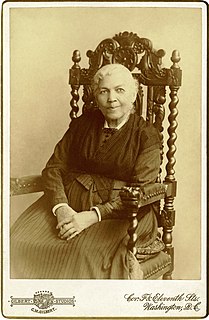A Quote by Ralph Waldo Emerson
All men are poets at heart. They serve nature for bread, but her loveliness overcomes them sometimes.
Related Quotes
Art is the child of Nature; yes, Her darling child, in whom we trace The features of the mother's face, Her aspect and her attitude, All her majestic loveliness Chastened and softened and subdued Into a more attractive grace, And with a human sense imbued. He is the greatest artist, then, Whether of pencil or of pen, Who follows Nature.
Nearly all men and women are poetical, to some extent, but very few can be called poets. There are great poets, small poets, and men and women who make verses. But all are not poets, nor even good versifiers. Poetasters are plentiful, but real poets are rare. Education can not make a poet, though it may polish and develop one.
If we go back to the beginning, we shall find that ignorance and fear created the gods; that fancy, enthusiasm, or deceit adorned them; that weakness worships them; that credulity preserves them and that custom, respect and tyranny support them in order to make the blindness of men serve their own interests. If the ignorance of nature gave birth to gods, the knowledge of nature is calculated to destroy them.
We ought to deal kindly with all, and to manifest those qualities which spring naturally from a heart tender and full of Christian charity; such as affability, love and humility. These virtues serve wonderfully to gain the hearts of men, and to encourage them to embrace things that are more repugnant to nature.
Men are rapists, batterers, plunderers, killers; these same men are religious prophets, poets, heroes, figures of romance, adventure, accomplishment, figures ennobled by tragedy and defeat. Men have claimed the earth, called it 'Her'. Men ruin Her. Men have airplanes, guns, bombs, poisonous gases, weapons so perverse and deadly that they defy any authentically human imagination.
Men of science, osteologists And surgeons, beat some poets, in respect For nature,-count nought common or unclean, Spend raptures upon perfect specimens Of indurated veins, distorted joints, Or beautiful new cases of curved spine; While we, we are shocked at nature's falling off, We dare to shrink back from her warts and blains.
'Nature is conquered by obedience' - and her resistless energies are at our bidding, as soon as we, by knowledge, work with them and not against them. We can choose out of her boundless stores the forces that serve our purpose in momentum, in direction, and so on, and their very invariability becomes the guarantee of our success.
Fishermen, hunters, woodchoppers, and others, spending their lives in the fields and woods, in a peculiar sense a part of Nature themselves, are often in a more favorable mood for observing her, in the intervals of their pursuits, than philosophers or poets even, who approach her with expectation. She is not afraid to exhibit herself to them.
English literature, from the days of the minstrels to the Lake Poets,--Chaucer and Spenser and Milton, and even Shakespeare, included,--breathes no quite fresh and, in this sense, wild strain. It is an essentially tame and civilized literature, reflecting Greece and Rome. Her wildness is a greenwood, her wild man a Robin Hood. There is plenty of genial love of Nature, but not so much of Nature herself. Her chronicles inform us when her wild animals, but not the wild man in her, became extinct.








































